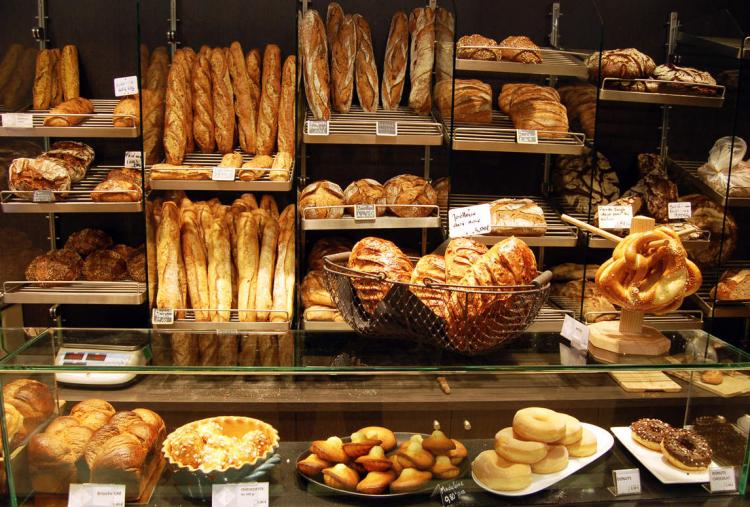Say Goodbye to "La Tradition"

A seemingly quick fix to get thin, cutting out bread and beer has become the hottest new diet trend. If you walk into a third-wave coffee shop anywhere in the U.S., you will more than likely see “gluten-free” labels over some delicious-looking muffins. With ever-changing food crazes sweeping through U.S. cities, consumers are no longer phased by dairy-free, vegan, paleo, and gluten-free sweet and savory treats behind brightly lit pastry cases.
But in France, home of gourmets and gourmands alike, eclairs, croissants, and -- bien sûr -- the baguette à la tradition, these diet trends seem blasphemous. Yet how is it possible that while strolling through almost any Paris neighborhood you can find a boulangerie touting the phrase “sans gluten”?
I blame America.
If, like the unfortunate Pedestrian Question victims seen in the video above, you think gluten is bread, wheat, flour, or pizza, let me clarify. Gluten is a protein component found in wheat, rye, and barley. It gives food products their elasticity and can be found in bread, pasta, flour, pastry, pizza dough, but also in sausages, beer, and some sauces and soups. Though some people are more sensitive to gluten than others, doctors do not yet have the diagnostic tools to detect gluten sensitivity. There are different levels of gluten intolerance, the most severe being celiac disease. For those who are severely gluten intolerant, symptoms can include diarrhea, bloating, and stomach cramps. But for those with the autoimmune disorder celiac disease, ingesting gluten damages the small intestine, and when left untreated, can lead to Type 1 diabetes, anemia, intestinal cancers, and other autoimmune disorders.
Photo: Positively CoeliacThese grim side effects are a serious reality for those diagnosed with celiac disease, yet for some reason, gluten-free has swept the American nation as the next trend in food and diet. Only about 1 percent of the the population has celiac disease, so why are 22 percent of adults avoiding gluten? Most believe that removing the gluten will lead to weight loss, but this it not always the case.
Contrary to popular belief, excluding gluten from your diet is not a miracle weight-loss solution. In fact, gluten-free products usually contain higher contents of fat, sugar, and sodium, meaning that you could actually gain weight when following a gluten-free diet (specifically if you substitute regular breads and pastries for the gluten-free ones).
This diet fad, like others before it, is not actually that healthy. Still, the previously assumed weight-loss benefits do not explain how the diet has gained the support of the French. We all know that the always chic Parisians have a natural born tolerance to gaining weight, so why would they trade flour for almond meal?
This epidemic did not appear overnight, but has been slowly creeping in as the popularity of American culture has increased with younger generations. Americanization is not a new theory, and over the last few years, America’s cultural influence in France is growingly apparent. As with most countries, it began with Coca Cola and McDonald’s. Next were the Levi’s and Nikes. These brands, as well as lifestyle trends and fashion styles, gain popularity the minute they gain celebrity support, and these days, American, Hollywood celebrities are international superstars. Their influence crosses borders and young people all over the globe are attempting to emulate their lifestyles. Next thing you know, French magazines such as Glamour will provide information on diet trends, referencing Pinterest and Instagram, both headquartered in California, and discuss weight loss tips, juice detoxes, and of course, where to eat sans-gluten in Paris.
Now, you can buy a Starbucks Caramel Frappuccino to go with your gluten-free tartelette. What will become of France if the baguette goes gluten-free? With completely sans-gluten boulangeries such as Chambelland and Helmut Newcake opening up around Paris, we may soon find out.









